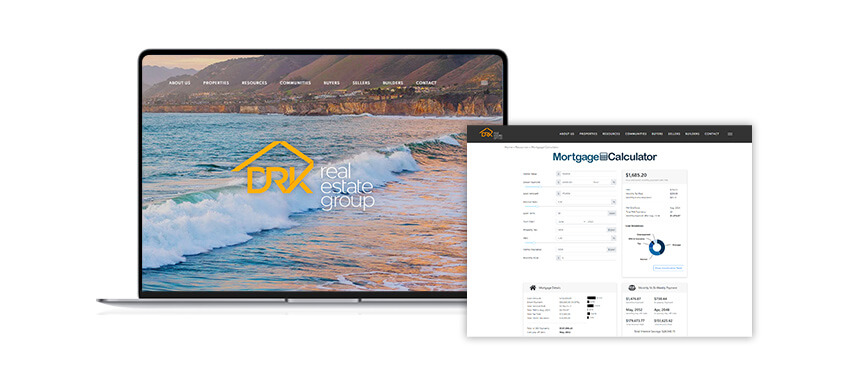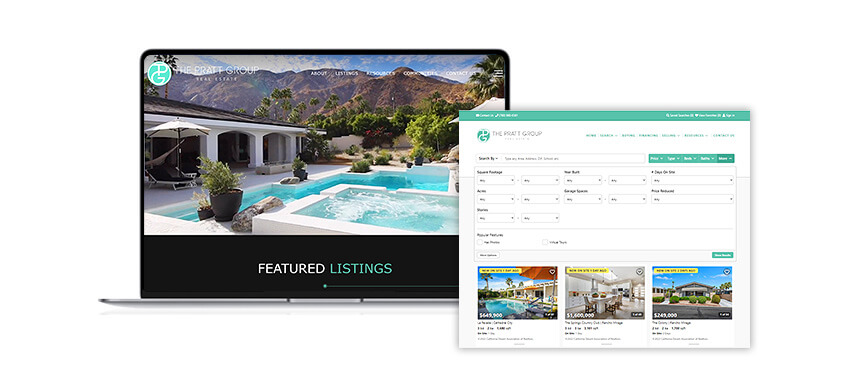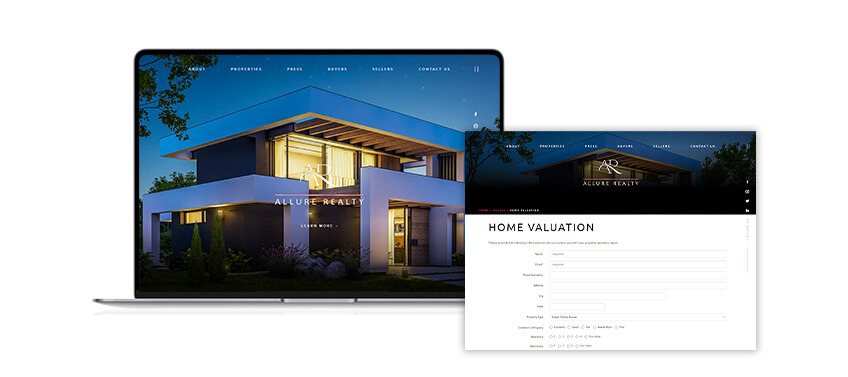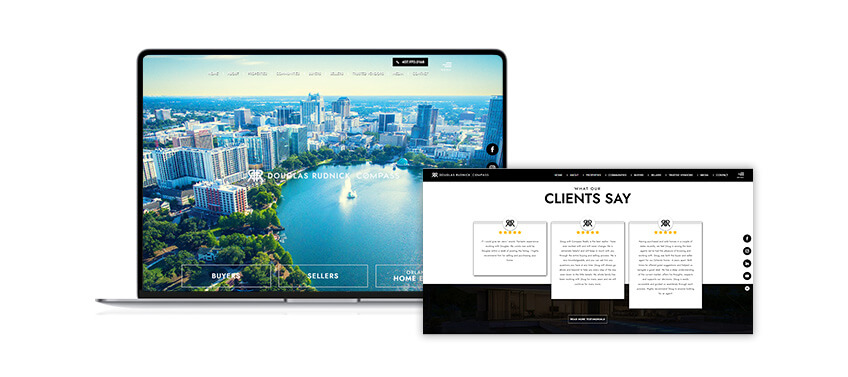20 Key Questions Homebuyers Ask and How to Answer Them
Buying a home can be a challenging process, especially for first-timers. And as a real estate agent, one of your main responsibilities is to provide your client with the necessary information they need, even if it’s as simple as answering the most common real estate questions homebuyers have. You can guide them by providing answers and solutions right on your real estate website.
Read on to know more about the 20 most frequently asked real estate questions homebuyers have for realtors.
Table of Contents
Turn your website into a homebuyer's best guide.
Let’s make it happen!
In this guide, we’ll explore 20 common real estate questions that home buyers frequently ask. By understanding these concerns, you’ll be better equipped to provide informed answers and guide your clients confidently through the homebuying process.
-
Should I buy or rent a home?
One of the most common first-time home buyer questions you’ll encounter is whether it’s better to buy or rent. The answer ultimately lies on the inquirer, but you can provide them with helpful information so they can weigh the pros and cons more carefully.
For instance, you can give your client a personalized financial analysis for a closer look at their situation and future plans. A rent-vs-buy calculator can also offer clearer insight.
-
What kind of home can I afford?
Budget is often a main deciding factor in a home search. Offering tools like an affordability calculator on your website helps buyers to set realistic expectations. A fine example is DRK Real Estate Group’s mortgage calculator, which website users can access in the “Resources” section. This tool allows homebuyers to understand how their income, credit score, and debts influence their purchasing power.
Additionally, you can provide a free market report or comparative market analysis (CMA) to give buyers a better grasp of local home prices and current market conditions.

-
Should I buy a new build or an existing home?
Both newly built and existing homes have their advantages, and as a real estate agent, you should give your clients a nuanced take. New constructions often feature modern amenities, are energy-efficient, and move-in ready, while resale properties have more character, potentially lower costs, and the benefit of being in well-established communities.
Understanding these factors and guiding your clients through the pros and cons of both options will help them make a decision that’s aligned with their financial and lifestyle goals.
-
What community amenities available in my desired area?
A home’s location is just as important as the property itself, which is why one of the most common real estate questions from buyers is about the local amenities. Most buyers want to know about nearby schools, shopping, healthcare facilities, and recreational areas.
You can offer a glimpse into the neighborhood through a detailed community guide like the Resources page on Brandi Pratt’s website– it helps clients imagine what it would be like to live in that particular area. Apart from including practical real estate market information, Include details on transportation, parks, and cultural hubs to paint a full picture.

-
How much do I need for a down payment?
Since most people need to take out a mortgage loan when purchasing a home, it’s only natural that some first-time home buyer questions for Realtors revolve around down payments.
The traditional 20% down payment is no longer a strict standard in residential real estate. Many buyers today put down as little as 3% to 5%, depending on the type of mortgage they qualify for. Government-backed loans, like FHA loans, allow for smaller down payments, making homeownership more accessible.
As an agent, it’s essential to inform clients about these options, as well as the potential costs of paying less upfront, such as private mortgage insurance (PMI).
-
When should I get pre-approved for a mortgage?
Mortgage pre-approval is highly recommended, especially among first-time homebuyers. It helps your clients lock in favorable terms and act quickly when they find the right property.
The best time to get a pre-approval is before the start of the home search. The process typically takes anywhere from one to three days, depending on two factors: your client’s requirements and the speed the lender processes applications. Once secured, the pre-approval letter is valid for 60 to 90 days.
Given this timeframe, advise your client to have their documents ready and apply early. You can also help website users by outlining the steps, like what The Altman Brothers did on their Buyers page.

-
Is it possible to cut costs on my mortgage?
A common concern among buyers is how to save money on their mortgage. And the best way to do so is to secure a competitive interest rate.
First-time homebuyer questions for Realtors often include how credit history impacts loan terms, so it’s important to guide your clients on improving their credit scores. Advise them to reduce outstanding debts, avoid new credit inquiries, and ensure they’re paying their bills on time.
For those who qualify, a Federal Housing Administration (FHA) loan is a valuable option, offering lower down payment and credit score requirements. Lastly, encourage them to explore other lending options; some states and counties offer homebuyer assistance programs.
-
How do I begin my home search?
Starting the home search is probably the most daunting part of the entire home-buying process. As a Realtor, it’s your job to simplify this. Websites like Robert Slack's offer multiple ways to search, from state-based searches to a dedicated Featured Listings page with virtual tours.
You can also provide tips that will help buyers personalize their homebuying journey. For instance, they can create a list of must-haves and non-negotiables. They can also draft a timeline that’s based on their priorities and schedule. A clear picture of the road ahead will give your clients an idea of which steps to focus on.

-
How do I navigate a seller’s or buyer’s market?
When advising clients on how to handle different market conditions, always provide actionable and clear guidance.
In the case of a seller’s market, where buyers outnumber available listings, you can advise buyers to act quickly and manage their expectations. Crafting a strong offer from the start– one with flexible contingencies and a larger earnest money deposit, for instance– can help them secure their dream home.
During a buyer’s market, where there is less competition and more choices, encourage clients to be patient and emphasize selection. Explain the importance of thorough market research and remind them that, in this market, they can push for a deal that works in their favor.
-
Can I buy and sell a home at the same time?
A straightforward question requires a straightforward answer: yes. But as an agent, take care to make buyers understand the pros and cons before making a decision. You can start by offering tools like checklists or guides on your website to aid them in their decision-making.
Should they wish to proceed with buying a home and selling their current property simultaneously, offer modern solutions like iBuyer programs, bridge loans, and sell-before-you-buy platforms. You may open up these options to clients, allowing them to make seamless transitions without financial strain. These tools reduce the stress of juggling two deals and minimize the risk of owning two homes at once – or none at all.
Need to Support Dual-Transaction Customers?
Ensure your website is decked with user-friendly tools and resources.
-
What’s my home’s market value?
Homeowners looking to sell want to know how much they can get for their current home. Offering a free property valuation report, like the one on Allure Realty’s website, helps clients understand what their property is worth. Include factors such as recent sales in the area, local market trends, and how renovations could boost value.
Give buyers a clear and detailed walkthrough of the report to give them a better understanding of their property’s market value. With a detailed market report and professional advice, you’re not only helping buyers– you are also positioning yourself as a knowledgeable and trusted resource.
When adding home value tools to your website, work closely with your developer or project manager to make the most of them. Ensure these tools are easy to find and use – they should be a natural part of your site's navigation. Consider placing them prominently on your homepage or in your main menu. Remember, the easier it is for visitors to find and use these valuation tools, the more likely they'll engage with your website.

-
How long do real estate transactions take?
Homebuyers are often eager to move into their new house as quickly as possible, but the timeline for closing a real estate transaction can vary. On average, it can take anywhere from 30 to 60 days, depending on factors such as financing, market conditions, and inspections.
When explaining transaction timelines to your homebuying clients, it’s important to set realistic expectations and, at the same time, highlight ways that can speed up the process. For instance, you can discuss options like making an all-cash offer (if possible), limiting contingencies, or being flexible with closing dates.
You can also suggest the use of e-signatures, virtual closings, and online mortgage applications. By leveraging these tools, buyers and sellers are ensured of a faster, more efficient real estate transaction. Staying informed about these technologies gives you a competitive edge in reducing delays and enhancing the overall transaction experience.
-
Can I back out of a contract?
If you have buyers who wish to discuss contract cancellations, give them a thorough understanding of their options, potential risks, as well as other factors that might impact the process, especially following the 2024 NAR settlement.
You can approach this topic by explaining contingencies in detail and the conditions under which they can lose their earnest money deposit. Walk buyers through the timeline and critical dates in the contract, including contingency deadlines. You can also provide risk scenarios where the buyer might want to back out. In these scenarios, explain to your clients how they can handle the situation and protect their interests at the same time.
Finally, consider creating educational resources on our website, such as a detailed blog post or FAQ page about backing out of real estate contracts. This way, you make yourself an invaluable resource and, at the same time, educate clients in current industry standards.
-
Do I really need a real estate agent?
It may seem awkward, especially since you are discussing your profession. But when faced with this question, don’t hesitate to highlight the unique value you bring to the table: market knowledge, negotiation skills, and access to listings that may not be publicly available.
You can also create compelling online content, like Jimmy Martinez’s client-focused introduction on his website: it helps reassure buyers that working with an agent is worthwhile. A page that discusses the specific real estate services you offer, as well as a separate tab for client testimonials and stories, can further demonstrate the value you bring as an agent.

-
Can I trust my real estate agent?
Trust is a major factor in any home-buying transaction, so don’t take it personal if a buyer poses this question.
To help them overcome their hesitation, you must establish trust from the beginning by being transparent and communicative. Start by sharing success stories, client testimonials, and reviews prominently on your website, just like what Douglas Rudnick did on his website homepage. Visual and social proof of success can help potential buyers and clients trust in your abilities.
When a buyer reaches out to you, build rapport by listening to their needs, preferences, and concerns. Make them feel that you genuinely care about finding the right home for them, not just making a sale. Establishing this rapport early on will help create a stronger foundation of trust.

-
How much should I pay in agent fees?
With the changes from the 2024 NAR settlement, it's more important than ever to be transparent with clients about commission fees. Explain the new rules that separate commission negotiations from MLS listings and provide a clear breakdown of how fees are structured. This ensures clients understand what they're paying for and builds trust. Walk them through your value proposition and services included in your fee structure, documenting these discussions for clarity. Consider creating a standardized disclosure form that outlines your commission structure and services, making it easier for clients to make informed decisions. After all, transparency isn't just about compliance—it's also about fostering long-term relationships and establishing yourself as a trusted advisor. Remember, when clients feel confident about the financial aspects of their transaction, they're more likely to become advocates for your business and refer you to others.
Offering tools like a commission calculator on your website also simplifies the process and highlights the value you bring to the transaction. Alternatively, you can add a home sale calculator like The Von Sues Group, which gives buyers an idea of how much sellers stand to make from their sale.

-
Are real estate commissions negotiable?
Clients looking to save money may ask for a lower commission rate. Be upfront about your flexibility, but also highlight the services and expertise you offer. Consider offering tiered service packages to accommodate different budgets while maintaining the quality of service that sets you apart.
When discussing commission rates, make sure to emphasize your value rather than focusing solely on the percentage. Break down your comprehensive service offerings, such as market analysis, negotiation expertise, and post-closing support. Remember that establishing transparent communication about pricing early in the relationship helps build trust and prevents misunderstandings later in the transaction.
-
Will climate change affect my home’s value or insurance?
As environmental concerns rise, buyers are increasingly asking about climate-related risks. As an agent, it’s important to offer both practical guidance and peace of mind.
You can broach this topic by redirecting buyers to reliable sources of climate risk data, such as government resources; they provide information on factors like flood zones, fire risks, and insurance implications. Explain insurance implications and make recommendations so buyers can get a better picture of potential costs and coverage options. Balance these with discussions about long-term property value.
If a property has certain climate risks, take the additional step of helping buyers explore potential solutions. Doing so not only educates and reassures buyers, but also helps you build trust with your clients.
-
Does remote work mean I can live farther away from the city?
With remote work changing homebuyers’ priorities, you must stay ahead of the trend and offer practical advice on how they can take advantage of their newfound location flexibility.
As you curate properties to show buyers, highlight home office features and other amenities that enhance a remote work setup, such as public transit options. It also helps to stay current with work-from-home trends, especially as remote work policies continue to evolve. Your awareness of these dynamics will position you as a knowledgeable and adaptable adviser.
-
Why do new homes cost more and take longer to build?
In a market where new builds are becoming more costly and timelines less predictable due to material shortages and supply chain disruptions, it’s essential to offer your buyers realistic guidance and alternative solutions.
Make sure you’re up-to-date on the latest trends in construction materials and supply chain issues so you can keep your clients informed. If the timelines don’t fit their schedules, offer other solutions, such as newly completed homes and resale properties.
By covering these key questions and providing practical solutions and tips regarding home-buying for beginners, you’ll position yourself as a knowledgeable, trusted advisor to home buyers.
Ready to level up your real estate business? At Agent Image, we create custom websites that help you stand out. Schedule your free consultation today at 1-800-979-5799!





